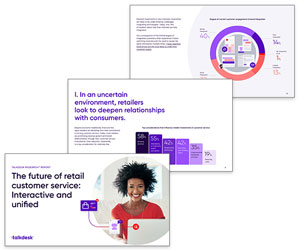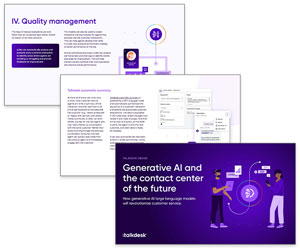When customers feel valued, they are far more likely to be happy and loyal.
So how do you refresh your processes, agent training, and more to promote this in your contact centre? We asked our consultants panel for their best ideas and here’s what they said…
1. Say ‘Thank You’ to Everyone Who Rates You Highly in Feedback Surveys

Massey
Say ‘thank you’ to everyone who scores you an 8, 9 or 10 in your (NPS or other) surveys.
There’s nothing more demoralizing than ranting on to friends about a company who then ignores you!
Contributed by: Peter Massey, MD & co-founder at Budd UK Ltd
2. Encourage Your Agents to Be Mindful of Their Tone of Voice

Communication is key. Pay attention not only to the words used but also to the tone of voice.
A friendly, respectful, and positive manner can greatly influence a customer’s perception of the interaction.
Contributed by: Katie Mares, a brand experience expert, TED talk speaker, and author of CustomHER Experience
You can find out more about how to use tone of voice in this article: How to Utilize Tone of Voice in the Contact Centre
3. Don’t Make Customers Search High and Low for a Contact Number
In a company’s efforts to drive the use of AI, chatbots, self-service or channels of the company preference, the customer preference is sometimes the last to be considered.
This can mean the customer contact journey may start from a point of frustration, with the customer having to search high and low for a contact number or an email, or having to funnel through the self-service experience – in the hope there’s an agent available on the other side.
This is far from an easy experience! Making it this hard to make contact is a sure-fire way to make your customers feel unloved and undervalued.
Contributed by: Katie Stabler, Founder and Director of Customer Experience at CULTIVATE Customer Experience by Design
4. Seek Out Kind, Respectful People in the Recruitment Process

Bhatnagar
The entire recruitment cycle is so important in creating a culture of warmth, kindness, and respect.
How your new hires and current staff are treated will be directly reflected to your customers.
Treat your employees like they matter, and show them that you value them, and they in turn will treat your customers like they matter and show them that they are valued.
Also, be sure to recruit for kind, respectful people (over previous contact centre experience) ready to serve and to care for your customers to make them feel that they matter:
- Look for people who are respectful to your receptionist or administrator instead of just those that use “interview speak” with you.
- Look for timeliness. Are they respectful of your time? Are they easy to reach during the interview process or do they make you and your recruiters chase them?
- Look for body language and posture when in a virtual or in-person interview. Do they look interested or not?
- Do they use abrupt words or cut you off during the interview?
Contributed by: Sangeeta Bhatnagar, Founder of SB Global
5. Don’t Chase WOW as Your End Goal

Watkin
Don’t chase WOW as your end goal! Sure, we love a feel-good campaign centred around the employee who walked uphill both ways in the snow to return a customer’s prized possession, but these are one-offs.
Something my team is focusing on this year is meeting our customers where they are at. Here’s an example… If a customer asks for a phone call, we call them.
If they want to schedule time with us, we book it on the calendar. This is just one example of the many preferences our customers have.
And what better way to appreciate them than to pay attention to their preferences and adjust our approach to meet their needs.
Contributed by: Jeremy Watkin, Director of Customer Experience and Support at NumberBarn
6. Encourage Agents to Send Out Handwritten Notes to Customers
A handwritten, personalized note to your team adds a special touch signifying genuine thought and appreciation.
This feel-good moment can be extended by your team to specific customers too. When a customer receives a handwritten positive message in the mail, this surprise shows that you truly care.
Contributed by: Afshan Kinder, ICMI Thought Leader and co-author of 3 books – including ‘Call Center for Dummies’
Note from the Editor, we saw this approach in action with sending out birthday cards to customers when we visited the Specsavers contact centre.
7. Inspire Agents to Be ‘CEO of the Moment’

Quiseng
To a complaining customer, agents are not the representative of the company. They ARE the company. So encourage your agents to own it. They are the CEO of the moment! They should take it personally, professionally, and responsibly. (Just don’t have them take it home.)
The customer is not always right. But the customer is ALWAYS their customer. So, they should do whatever it takes to make the customer FEEL right.
Contributed by: Bill Quiseng, Chief Experience Officer at billquiseng.com
8. Make It Easy for Customers to Provide Feedback
Provide easy and accessible channels for customers to provide feedback. Not only does this show that you value their opinions, but it also gives insights into areas where you can improve to better meet their needs.
You should also regularly review and refine your processes based on customer feedback and evolving trends.
This shows customers that their input matters and that you’re committed to providing the best experience possible.
Contributed by: Dan Pratt, Founder & Director DAP Consultancy
9. Respect Your Customers’ Time

If you want your customers to feel valued, the company needs to respect the customers’ time, as not doing so can really damage loyalty.
So how do you respect customers’ time? A lot of companies are investing in AI-driven chatbots, so they can handle simpler queries without even having to talk to an agent.
This is a very good thing, as the agent can now deal with higher-level issues, faster, which is more fulfilling for them too.
Beyond this, if you invest in AI to take care of the agent too, you then don’t have to train them on the exact information you need them to know (you just have to train them on how to interpret that information).
This then gives them more mental capacity to show empathy, sympathy, concern, and enthusiasm to reflect whatever that customer is experiencing – helping the customer feel more valued.
Contributed by: Shep Hyken, Chief Amazement Officer (CAO) at Shepard Presentations LLC
10. Don’t Underestimate the Role of Laughter

Mullard
Armed with information, contact centres have the job of serving up the data either through automated self-serve customer journeys or made easily accessible to agents conversing with customers.
But simply having ‘big’ data is not enough. Feeling cared for goes deeper than relaying facts. Feeling valued goes to the very core of how we will react and, importantly, the next steps we take.
A recent experience offered up a first-class example of this. Something as dry as cancelling an insurance policy because of life changes could have been a turgid affair; the facts were there, the carefully scripted compliance wording, the terms of cancellation and consequences read out.
But the difference was in the empathy shown by the call handler who had a conversation with me. We laughed at the ‘typical’ nature of such things, my circumstances, etc.
She didn’t mind my questioning which call centre she was in, the fact that she’s working a hybrid model… It was all there…the personal touch! She elevated a mere transaction to a customer experience that I’ll harp on about for days.
Contributed by: Beverley Mullard (previously ‘Hughes’), a respected voice within the contact centre community
11. Interview Your Customers and Agents to Understand Their Perspectives

Interview actual customers to understand their experience and perspective, incorporate each of the marketing and customer interaction channels, and interview frontline staff to add their context to the process.
At each point in the customer journey, we can examine if the actions and activities support the desired customer experience and how cared for and valued the customers may feel.
This examination can then point to processes, procedures, and policies that support or erode those feelings of being cared for and valued.
Those that create friction in the relationship or interaction, that undermine the feelings that we want to create can be revisited and revised to eliminate friction and support the desired customer experience.
Contributed by: Colin Taylor, Founder of ApexCX, Customer Experience Support Services
12. Work Closely With Other Departments to Create More Consistent CX

Consistency is key in delivering great customer service. Consider this: if a customer has nine good experiences and one bad one, which experience is the customer likely to remember?
So build consistency through training, coaching, and process improvement. Leverage team huddles and meetings to reinforce key procedures.
Reach out to other departments to create a smooth customer experience throughout your organization – since shipping, billing and quality issues will diminish customer satisfaction.
It can also help to create a ‘Voice of the Employee’ process for agents to suggest improvements to their contact centre management team.
Contributed by: Mike Aoki, President, Reflective Keynotes Inc.
13. Use Titles and Names as Often as Possible
Use titles and names, as often as possible, in a manner that shows respect! I do not use my first name; I have a preferred name; when I tell you my preferred name, and it is not used, I DO NOT CARE about anything else. I have earned an educational title. I have earned military titles.
Earning these took effort and time, and while I do NOT insist on them, my willingness to hear and invest logic, reason, and emotion goes up when used.
If I tell an agent my preferred name, and they refuse, I will NOT engage with anything but severe politeness.
Contributed by: Dr M. Dave Salisbury, COO at D&C Consulting LLC
14. Practise the Three Rs of Building Rapport

Gormley
Using these three principles can help agents build an emotional and personalized connection with customers and leverage the skills of emotional intelligence, so customers going away feeling valued, heard, and understood!
REACT to the information you are presented with using empathy and emotional authenticity. Often, we can forget there’s another person at the end of the conversation, so reacting from a place of empathy allows the agent to take a moment to acknowledge how they feel.
REMEMBER that what we know about our customers needs to be logged, as a key frustration for customers is having to repeat themselves. This links back to the quality of notes, as we can’t always guarantee that the customer will speak to the same advisor.
REUSE! Customers feel heard when the information they’ve given isn’t only played back to them, but it’s played back in a way that shows you’ve heard and understood what’s been said – by summarizing and paraphrasing back key points.
Contributed by: Garry Gormley, Founder, CEO – FAB Outsourced Solutions
15. Treat Customers as Individuals – Not Just Ticket Numbers

Move away from scripted responses towards personalized interactions. Use CRM systems to track customer preferences and history, allowing agents to tailor their responses accordingly. This shows customers that you see them as individuals, not just ticket numbers.
Don’t wait for customers to reach out with problems either. Reach out to them first, whether it’s to offer assistance, provide updates, or simply express appreciation for their loyalty.
Proactive engagement demonstrates that you’re thinking about their needs even before they arise.
Contributed by: Dan Pratt, Founder & Director DAP Consultancy
16. Train Agents on Reflective Listening – Not Active Listening
Helping customers feel cared about and valued begins, lives, and dies horribly with how your agents listen.
STOP active listening. If you, as a call centre leader, are not practising, encouraging, and supporting reflective listening, the customer will NEVER hear you!
Reflective listening is listening with the intent to understand and reach a resolution. Active listening is heard, and the fake comes through crystal clear.
Dump the canned phraseology too! Customers can hear the canned phrases, and frankly, they hate them!
An agent does not sound sincere when the words are selected for them. There is a difference between help and solve, and award-winning customer service agents will practise their language of speaking, timing, and speeds – including the pronunciation of technical words.
Contributed by: Dr M. Dave Salisbury, COO at D&C Consulting LLC
17. Agents Should Appeal to Customer’s Emotions to Show How Much They Care

Bauzee
Science tells us that a human’s decision-making process is emotional first, then logical.
If you take a complaining client, for instance, when you decide to resolve the situation with logic only without first acknowledging its emotional origin, it is a recipe for failure.
The goal of listening, paraphrasing, and empathizing when dealing with complaints is key to acknowledge the customer’s emotions and show how much you care.
Contributed by: Pierre Bauzee, Founder of Beyond Satisfaction
18. Understand Customers’ Initial Reasons for Buying

Kinder
Coach your team to learn the initial reason customers chose your product or service.
By recommending features that match your customer’s original purchase intention, they can surprise and delight.
For instance, if a customer’s goal of building savings for a dream trip has not transpired, they could suggest an automatic deposit feature.
This easy-to-implement solution can make your customer’s dream come true.
Contributed by: Afshan Kinder, ICMI Thought Leader and co-author of 3 books – including ‘Call Center for Dummies’
19. Train Agents to Be Resourceful in Finding Solutions
Strive to be the hero in every customer interaction. This means taking ownership of the customer’s problem, being resourceful in finding solutions, and ensuring the customer leaves the interaction feeling their issue has been completely and satisfactorily resolved.
Contributed by: Katie Mares, a brand experience expert, TED talk speaker, and author of CustomHER Experience
20. Think About What You Can Offer to Strengthen Loyalty

Stabler
Loyalty is really hard to achieve these days! So if you have already done the hard work and nurtured customer loyalty, don’t let it slip away.
Think about things you can implement to grow the strength of the loyalty… Can you gamify your relationship with longevity ‘tiers’? Can you unexpectedly throw in some freebies? Can you make the premium at renewal cheaper?
Ok, ok, you’re a business, you can’t just throw money away… but seriously, just think what your retention levels could look like and the ROI you could achieve in the longer term.
Contributed by: Katie Stabler, Founder and Director of Customer Experience at CULTIVATE Customer Experience by Design
21. Train Agents to Recognize Customers’ Words and Speaking Mannerisms
Customers feel valued when they know they are being treated as unique individuals and communicated in a manner that resonates with them.
In my experience with human behavioural training, agents that are trained to recognize words or speaking mannerisms of their customers tend to have more upsells and cross-sells and higher CSAT scores.
Understanding the model of human behaviour, we can recognize what is important to our customers based on quick conversations.
Adapting our communication style and the words we use can create better experiences to make the customer feel valued.
Contributed by: Sangeeta Bhatnagar, Founder of SB Global
To discover more great ways to improve your customer experience and connect with your customers, read these articles next:
- 3 Steps to Better Understanding Your Customers
- How to Build an Emotional Connection With Customers
- Expert Strategies to Improve Customer Happiness
Author: Megan Jones
Reviewed by: Xander Freeman
Published On: 20th Mar 2024 - Last modified: 15th May 2024
Read more about - Customer Service Strategy, Afshan Kinder, Beverley Mullard, Bill Quiseng, Colin Taylor, Customer Loyalty, Customer Satisfaction (CSAT), Customer Service, Dan Pratt, Dave Salisbury, Editor's Picks, Emotion, Garry Gormley, Jeremy Watkin, Katie Mares, Katie Stabler, Mike Aoki, Peter Massey, Pierre Bauzee, Sangeeta Bhatnagar, Shep Hyken, Top Story









































